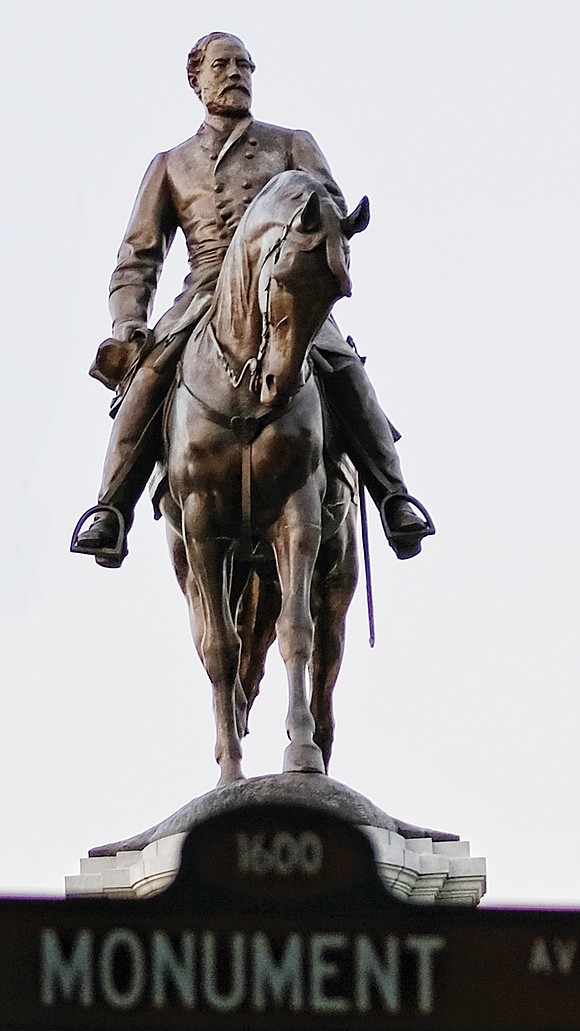Lee statue to remain under new 90-day injunction
Jeremy M. Lazarus | 8/6/2020, 6 p.m.
The statue of slavery-defending Confederate Gen. Robert E. Lee will continue to loom over Monument Avenue for at least 90 more days.
In a legal battle full of tangles, Richmond Circuit Court Judge W. Reilly Marchant this week issued his own injunction to temporarily block Gov. Ralph S. Northam from taking down the 12-ton, 130-year-old statue.
The injunction is to remain in force until a full hearing is held on the merits of the governor’s proposal. That hearing has not been scheduled.
The issue of the Lee statue continues to percolate even after the removal of virtually all other publicly owned Confederate icons in Richmond and City Council approval of their future disposal.
Judge Marchant took over the cases in mid-July after another judge, Richmond Circuit Court Judge Bradley B. Cavedo, stepped aside because he lives in the Monument Avenue Historic District near the statue.
Judge Marchant issued his restraining order Monday against Gov. Northam to block the Lee statue’s removal in two written opinions stemming from a July 23 court hearing.
In a win for Gov. Northam, Judge Marchant first threw out Judge Cavedo’s original injunction as having no basis in law as argued by Attorney General Mark R. Herring.
The opinion boosted the credibility of two recently filed complaints seeking Judge Cavedo’s removal from the bench for allegedly ignoring the judicial requirement to be impartial. The complaints were filed with the Judicial Inquiry and Review Commission, the state’s disciplinary body for judges.
In a separate case brought on July 22 by Monument Avenue preservationist Helen Marie Taylor and four other property owners within the Monument Avenue Historic District, Judge Marchant issued the 90-day injunction. He wrote in an Aug. 3 opinion that the plaintiffs had standing, or a legal right to sue, based on their property ownership and linkage to the statue and the harms they allege they would suffer if the Lee statue is removed.
Judge Marchant wrote that the plaintiffs had offered arguments that were strong enough to justify a temporary restraining order keeping the statue in place based on state Supreme Court precedents.
The plaintiffs claim in their suit that removal of the statue could result in a loss of the National Historic Landmark designation for Monument Avenue and a reduction in the value of their properties. They also claim they would be harmed by “the loss of a priceless work of art and the degradation of the internationally recognized avenue on which they reside.”
Judge Marchant wrote that a brief delay would not harm the state, but could cause harm to the plaintiffs if the statue were removed before the issues they raised were fully litigated.
Mr. Herring and his office had little time to prepare for the case, which was filed the day before the scheduled July 23 hearing on the original Lee statue case. He also did not seek to remove the case to federal court as he did the first time Ms. Taylor and the plaintiffs filed the case in June. The original Lee statue case was brought by William C. Gregory, a great-grandson of two association members that gave the land, the Lee statue and its pedestal to the state in 1890.
Judge Cavedo used the Gregory case on June 8 to block Gov. Northam from removing the Lee statue. He followed up on June 18 by extending his restraining order until July 23 even though he dismissed Mr. Gregory’s original court filing. He justified his injunction by giving Mr. Gregory time to amend his lawsuit to show he had a right to sue.
In ruling on the Gregory case after Judge Cavedo stepped aside, Judge Marchant found that Mr. Gregory lacked any legally recognizable property interest in the Lee statue and land upon which it sits. He also wrote that the law Mr. Gregory claimed would be violated if the statue were removed “provides no right of action under which any member of the general public ... can proceed” and that automatically precludes an injunction.
As a result, “both of plaintiff’s substantive claims fail as a matter of law,” Judge Marchant wrote in dismissing the case with prejudice, meaning that Mr. Gregory cannot bring it again.







